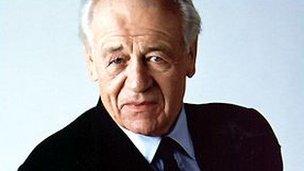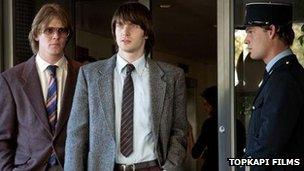Fascination with the 'Dutch godfather'
- Published
Willem Holleeder's criminal past has led to the making of a new film
The man known as the godfather of Dutch crime has been released from prison in the Netherlands. Willem Holleeder served six years of a nine-year sentence for extortion. He has been a hugely powerful, notorious and influential figure on the Dutch underworld for decades.
Holleeder's most infamous crime has recently been turned into a movie soon to be released across Europe and there is a new Hollywood version in the making.
So what makes him such an irresistible figure in crime fiction? Thriller novelist Ton Theunis believes the answer lies in his character rather than his crimes.
"He has this incredible aura about him. Like he is completely in control. Even inside it was like he was untouchable," Theunis says.
"He has a very strong presence and you can really feel that. He is exciting and dangerous and for some reason we will always be attracted to those things."
Life of crime
In 1958 Willem Holleeder was born in Amsterdam. His father worked at the Heineken factory. Friends say he had a difficult childhood.
One source who wishes to remain anonymous remembers growing up in the same area as Holleeder. In his early teenage years, Holleeder's gang was already establishing itself as a powerful force in the playground.
"They used to roar up on the latest mopeds, mostly stolen from German tourists, when we were all playing football," he says.
"Holleeder and his friends would invade the pitch and try to play and if any of us tried to object we'd get whacked with a motorbike helmet."
An early indication, perhaps, of the path Holleeder was destined to pursue.

Freddy Heineken was left unharmed after a large ransom was paid - but police still had to find him
Theunis met Holleeder when the former was working as a prison guard and the latter was locked up for extortion.
"He has been linked to just about every murder in Amsterdam in the last 30 years. But the police can never pin anything on him because of a lack of evidence," Theunis says.
Despite efforts on both sides to kill or capture Willem Holleeder, the "Dutch godfather" remains alive and now he is free.
Perfect kidnapping?
The Heineken Kidnapping is a fictional adaptation of a true story.
On 9 November 1983 Holleeder and his gang executed what they believed would be the perfect kidnapping. Armed with Uzis and shotguns they headed for Heineken HQ.
Grabbing beer magnate Freddy Heineken and his chauffeur Ab Doderer off the street at gunpoint, they bustled them into the back of a van. The hostages were driven to an abandoned lockup near the harbour where a secret room at the back had been specially converted to function as a makeshift cell.
When the hostages were securely shackled the kidnappers demanded a ransom of 16m euros ($21m; £13.3m).
Eventually Heineken's family handed over the cash. But instead of releasing the hostages, Holleeder's gang fled leaving Freddy and Ab locked up.
Luckily the police had a lead through a Chinese takeaway the gang had been using. After three weeks in captivity they were finally rescued.
Blocking the blockbuster
They were accused of a plethora of crimes including murders, blackmails and shoot-outs but it was this single event that gave Holleeder's gang a reputation more notorious than any other in Dutch history.
The Heineken kidnapping had all the makings of a blockbuster. But the uncooperative star of the show, Willem Holleeder, launched a lawsuit from behind bars to try to stop the film from being released.
"Mr Holleeder didn't like how the character was depicted in the film," says Jens van den Brink, the lawyer representing the film company IDTV.
"For example, in the film there is a mock execution like Russian roulette where they put the gun to the head of Heineken and pull the trigger.
"Mr Holleeder said: 'That never happened and you are making people think we are worse than we really are.' I argued that first, there is artistic licence and second, if you have already kidnapped two men at gunpoint and chained them to a dirty mattress in an abandoned warehouse - well, it is hard to harm the reputation of someone accused of doing so many terrible things."
The release
Almost three decades have passed since the Heineken kidnapping. These days the real William Holleeder isn't the young, virile, untouchable gangster feared by so many back in the 80s.
Most of his former colleagues have been murdered, locked up or taken off to less dangerous destinations. Holleeder has repeatedly refused earlier parole - maybe feeling life is safer on the inside than it is on the outside. According to those that know Willem he is not looking forward to freedom.

Holleeder failed to stop the film's release - the creators insist no one character corresponds to him
Does crime writer Ton Theunis think this fear is justified?
"Imagine you are accused of being involved in so many murders. Maybe you have not been found guilty but still you know people want you dead," Theunis says.
"I remember working at the prison and one of the prisoners was being allowed to go home for Christmas," he recalls.
"I was watching him leave, he got on his bike in a shiny new track suit smiling and waving at us. Then as soon as he got to the car park - bang! - and he was gone.
"Criminals are killed all the time. Of course Holleeder is right to be afraid."
Willem Holleeder reportedly left prison in a car with blacked out windows before being transferred to another secret vehicle. It is a whole new underworld out there. He no longer commands control over the criminal network in the way he once did and his health is not what it used to be.
There is speculation Holleeder will try to escape the Netherlands on the next available flight. He has so far turned down all of our interview requests and his lawyer says he wants to avoid any further attention.
- Published27 January 2012
- Published21 October 2011